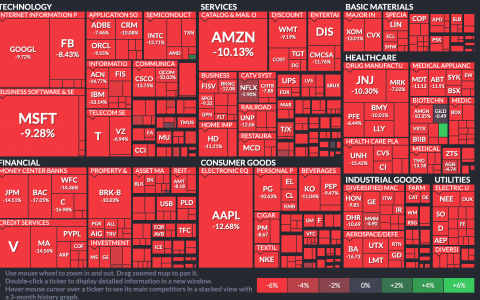
(Forbes) It’s the most eventful 0.2% gain of Bill Ackman’s career.
The billionaire investor entered 2020 long a handful of brand name companies like Berkshire Hathaway, Hilton Worldwide and Chipotle. But his $6.5 billion in assets firm, Pershing Square, weathered what was the quickest 30% market drop in a century after Ackman decisively hedged his portfolio from the coronavirus pandemic.
In late February after weeks of fretting about the effects of the pandemic, Ackman paid $27 million in premiums to buy credit default swap insurance on investment grade and high yield bond indices, judging that their tight spreads were the most mis-priced way of playing the looming financial chaos. He was right. Financial markets went haywire in March and the hedges ultimately yielded a $2.6 billion payout for Pershing Square.
Behind the scenes, Ackman’s trades were precise and efficient. His public performances, however, verged on recklessness and left a lot to the imaginations of some Wall Street watchers.
On the morning of March 18, Ackman woke up with a strong opinion on how to curb the spread of the coronavirus. He judged that it was a contagion, which could fizzle out without transmission, but would spread at an exponential rate if drastic containment steps weren’t taken. So he tweeted that President Trump should effectively shut the country down for 30-days and pay Americans to stay in quarantine.
CNBC saw the tweets and invited the billionaire investor, who is known for making controversial statements in his public appearances, onto its highly-watched afternoon market show. U.S. stocks were already down 5%-plus when CNBC cut away from President Trump’s afternoon address so Ackman could call in. And once Ackman got going, he started to sound like a messenger of doom.
“Hell is coming,” he said of the virus, “There is a tsunami coming.”
Ackman told interviewer Scott Wapner he’d pulled cash from ATMs, the kind of incendiary statement few on Wall Street would ever make publicly even if they’d done just that. “Shut it down now,” said Ackman of the economy, otherwise the pandemic would stretch months and cause business-after-business in America to fail. “Capitalism does not work in an 18-month shutdown, capitalism can work in a 30-day shutdown.”
“Hilton is the canary in the coal mine,” said Ackman of the hotelier, one of his larger holdings. Without quicker action, “it’s going to zero along with every other hotel company,” he predicted.
Markets plunged during the interview and hit a circuit breaker, closing for 15-minutes. Ackman says it’s “a highly dubious assertion” to believe his interview moved markets.
Perhaps, he’s right. But during a sharp correction, a highly-followed billionaire investor sounding panicked on primetime financial television doesn’t help things. Furthermore, most of the companies Ackman mentioned by name hit their 2020 lows as he spoke, falling as much as 20%-plus intraday.
As he laid out a bleak downside scenario, Ackman also said he was becoming bullish and was adding to positions like Hilton because he believed the government would do the right thing. But the performance backfired. For many viewers, his “shouting from the rooftops” about the potential calamity ahead, trumped the bullish views he also expressed.
*In a series of tweets on Saturday afternoon, Ackman added further detail by stating Pershing Square had bought $2 billion worth of stocks by the time he’d gone on CNBC. In the ensuing week, Ackman closed the hedge in full and continued to buy stocks like Starbucks, Hilton, Berkshire and Agilent hand over fist.
He tried to sound more measured in an interview with Bloomberg Television’s Vonnie Quinn, which more clearly laid out his bullishness and his stock purchases. Ultimately, Pershing Square may end March up for the year, a heroic performance in such cratering markets.
However, Ackman’s CNBC interview caused some to wonder whether he’d incited panic for his own benefit.
On Thursday evening, Ackman perceived enough blowback from the appearance, he put out a press release to explain himself. By the time he went on air, Pershing Square had already exited half of its hedge position. And the credit hedge had run its course by then, regardless.
“By Wednesday, March 18th at 12:30pm, when I appeared on CNBC, we had already sold slightly more than half of the notional amount of our CDS, realizing a gain of more than $1.3 billion, with the unrealized portion of our hedge having a market value at that time of $1.3 billion for a total of $2.6 billion,” he said. “Importantly, our hedge had already paid off prior to my going on CNBC,” added Ackman with emphasis.
He further explained, “I went on CNBC to further explicate my tweets, and to explain why I had gone from being very bearish to bullish, with a caveat.”
“In sum, I explained to Scott that I believed that the best approach to killing off the virus was for the entire country to close the borders and shut down for 30 days, other than for essential businesses, government, and services. Then, carefully, the country could be reopened with testing of all Americans, social distancing, higher mask usage, and other mitigation practices,” said Ackman, who added, “I also explained that the alternative of an 18-month period of rolling shutdowns would likely bankrupt almost every business, even dominant, well-capitalized ones.”
Later on, he summed it all up: “On CNBC, I disclosed my beliefs to the best of my ability. Yes, I got somewhat emotional as I talked about protecting my immune-compromised father from the ravages of the virus. But, I had become bullish because of my belief that the entire country would soon go into lockdown, and that would be the fastest and best way to minimize the impact of the virus.”
“I also wanted to shout from the rooftops about the importance of taking the virus seriously so that we would build a consensus to lockdown the country as soon as possible,” he concluded.
But was it all necessary?



